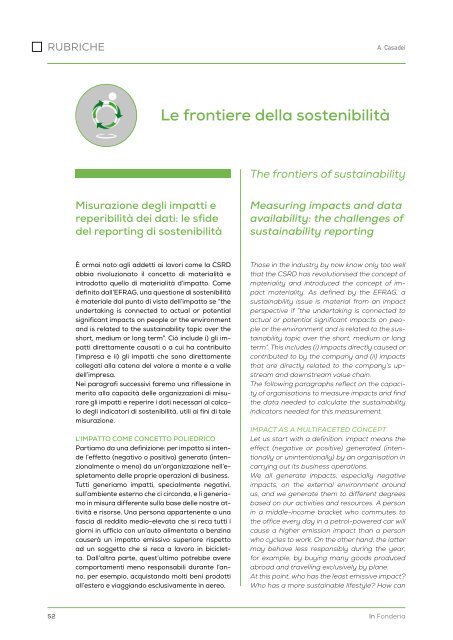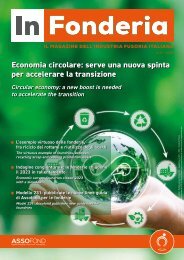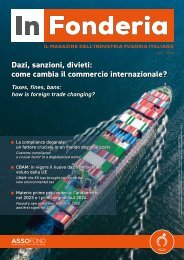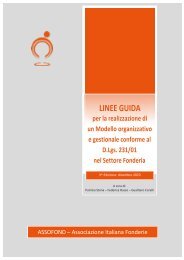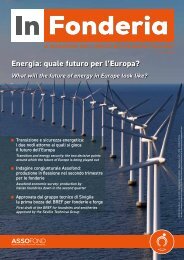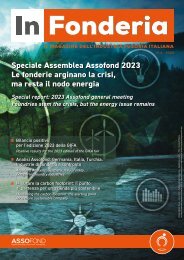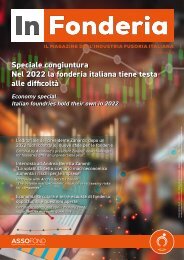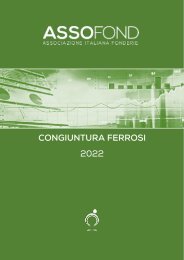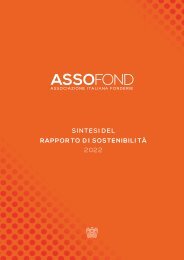In Fonderia 6 2023
Sesto numero del 2023 di In Fonderia
Sesto numero del 2023 di In Fonderia
You also want an ePaper? Increase the reach of your titles
YUMPU automatically turns print PDFs into web optimized ePapers that Google loves.
RUBRICHE<br />
A. Casadei<br />
Le frontiere della sostenibilità<br />
The frontiers of sustainability<br />
Misurazione degli impatti e<br />
reperibilità dei dati: le sfide<br />
del reporting di sostenibilità<br />
Measuring impacts and data<br />
availability: the challenges of<br />
sustainability reporting<br />
È ormai noto agli addetti ai lavori come la CSRD<br />
abbia rivoluzionato il concetto di materialità e<br />
introdotto quello di materialità d’impatto. Come<br />
definito dall’EFRAG, una questione di sostenibilità<br />
è materiale dal punto di vista dell’impatto se “the<br />
undertaking is connected to actual or potential<br />
significant impacts on people or the environment<br />
and is related to the sustainability topic over the<br />
short, medium or long term”. Ciò include i) gli impatti<br />
direttamente causati o a cui ha contribuito<br />
l’impresa e ii) gli impatti che sono direttamente<br />
collegati alla catena del valore a monte e a valle<br />
dell’impresa.<br />
Nei paragrafi successivi faremo una riflessione in<br />
merito alla capacità delle organizzazioni di misurare<br />
gli impatti e reperire i dati necessari al calcolo<br />
degli indicatori di sostenibilità, utili ai fini di tale<br />
misurazione.<br />
L’IMPATTO COME CONCETTO POLIEDRICO<br />
Partiamo da una definizione: per impatto si intende<br />
l’effetto (negativo o positivo) generato (intenzionalmente<br />
o meno) da un’organizzazione nell’espletamento<br />
delle proprie operazioni di business.<br />
Tutti generiamo impatti, specialmente negativi,<br />
sull’ambiente esterno che ci circonda, e li generiamo<br />
in misura differente sulla base delle nostre attività<br />
e risorse. Una persona appartenente a una<br />
fascia di reddito medio-elevata che si reca tutti i<br />
giorni in ufficio con un’auto alimentata a benzina<br />
causerà un impatto emissivo superiore rispetto<br />
ad un soggetto che si reca a lavoro in bicicletta.<br />
Dall’altra parte, quest’ultimo potrebbe avere<br />
comportamenti meno responsabili durante l’anno,<br />
per esempio, acquistando molti beni prodotti<br />
all’estero e viaggiando esclusivamente in aereo.<br />
Those in the industry by now know only too well<br />
that the CSRD has revolutionised the concept of<br />
materiality and introduced the concept of impact<br />
materiality. As defined by the EFRAG, a<br />
sustainability issue is material from an impact<br />
perspective if “the undertaking is connected to<br />
actual or potential significant impacts on people<br />
or the environment and is related to the sustainability<br />
topic over the short, medium or long<br />
term”. This includes (i) impacts directly caused or<br />
contributed to by the company and (ii) impacts<br />
that are directly related to the company’s upstream<br />
and downstream value chain.<br />
The following paragraphs reflect on the capacity<br />
of organisations to measure impacts and find<br />
the data needed to calculate the sustainability<br />
indicators needed for this measurement.<br />
IMPACT AS A MULTIFACETED CONCEPT<br />
Let us start with a definition: impact means the<br />
effect (negative or positive) generated (intentionally<br />
or unintentionally) by an organisation in<br />
carrying out its business operations.<br />
We all generate impacts, especially negative<br />
impacts, on the external environment around<br />
us, and we generate them to different degrees<br />
based on our activities and resources. A person<br />
in a middle-income bracket who commutes to<br />
the office every day in a petrol-powered car will<br />
cause a higher emission impact than a person<br />
who cycles to work. On the other hand, the latter<br />
may behave less responsibly during the year,<br />
for example, by buying many goods produced<br />
abroad and travelling exclusively by plane.<br />
At this point, who has the least emissive impact?<br />
Who has a more sustainable lifestyle? How can<br />
52<br />
<strong>In</strong> <strong>Fonderia</strong>


